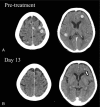Rapid intracranial response to osimertinib, without radiotherapy, in nonsmall cell lung cancer patients harboring the EGFR T790M mutation: Two Case Reports
- PMID: 28178168
- PMCID: PMC5313025
- DOI: 10.1097/MD.0000000000006087
Rapid intracranial response to osimertinib, without radiotherapy, in nonsmall cell lung cancer patients harboring the EGFR T790M mutation: Two Case Reports
Abstract
Rationale: Most of nonsmall cell lung cancer (NSCLC) patients harboring epidermal growth factor receptor (EGFR) activating mutations eventually acquire resistance to the first EGFR-tyrosine kinase inhibitors (TKIs) therapy after varying periods of treatment. Of note, approximately one-third of those patients develop brain metastases, which deteriorate their quality of life and survival. The effect of systemic chemotherapy on brain metastases after acquisition of EGFR-TKI resistance is limited, and thus far, whole-brain radiation therapy, which may cause the harmful effect on neurocognitive functions, has been the only established therapeutic option for especially symptomatic brain metastases. Osimertinib is a third-generation oral, potent, and irreversible EGFR-TKI. It can bind to EGFRs with high affinity even when the EGFR T790M mutation exists in addition to the sensitizing mutations. Its clinical efficacy for NSCLC patients harboring the T790M mutation has already been shown; however, the evidence of osimertinib on brain metastases has not been documented well, especially in terms of the appropriate timing for treatment and its response evaluation.
Patient concerns, diagnoses, and interventions: We experienced 2 NSCLC patients with the EGFR T790M mutation; a 67-year-old woman with symptomatic multiple brain metastases administered osimertinib as seventh-line chemotherapy, and a 76-year old man with an asymptomatic single brain metastasis administered osimertinib as fifth-line chemotherapy.
Outcomes: These patients showed great response to osimertinib within 2 weeks without radiation therapy.
Lessons: These are the first reports to reveal the rapid response of the brain metastases to osimertinib within 2 weeks. These cases suggest the possibility that preemptive administration of osimertinib may help patients to postpone or avoid radiation exposures. In addition, rapid reassessment of the effect of osimertinib on brain metastases could prevent patients from being too late to receive essential radiotherapy.
Conflict of interest statement
The authors have no funding and conflicts of interest to disclose.
Figures




References
-
- Namba Y, Kijima T, Yokota S, et al. Gefitinib in patients with brain metastases from non-small-cell lung cancer: review of 15 clinical cases. Clin Lung Cancer 2004;6:123–8. - PubMed
-
- Porta R, Sanchez-Torres JM, Paz-Ares L, et al. Brain metastases from lung cancer responding to erlotinib: the importance of EGFR mutation. Eur Respir J 2011;37:624–31. - PubMed
-
- Park J, Kim T, Lee H, et al. Efficacy of epidermal growth factor receptor tyrosine kinase inhibitors for brain metastasis in non-small cell lung cancer patients harboring either exon 19 or 21 mutation. Lung Cancer 2012;77:556–60. - PubMed
-
- Hoffknecht P, Tufman A, Wehler T, et al. Efficacy of the irreversible ErbB family blocker afatinib in epidermal growth factor receptor (EGFR) tyrosine kinase inhibitor (TKI)-pretreated non-small-cell lung cancer patients with brain metastases or leptomeningeal disease. J Thorac Oncol 2015;10:156–63. - PMC - PubMed
-
- Mujoomdar A, Austin JH, Malhotra R, et al. Clinical predictors of metastatic disease to the brain from non-small cell lung carcinoma: primary tumor size, cell type, and lymph node metastases. Radiology 2007;242:882–8. - PubMed
Publication types
MeSH terms
Substances
LinkOut - more resources
Full Text Sources
Other Literature Sources
Medical
Research Materials
Miscellaneous

